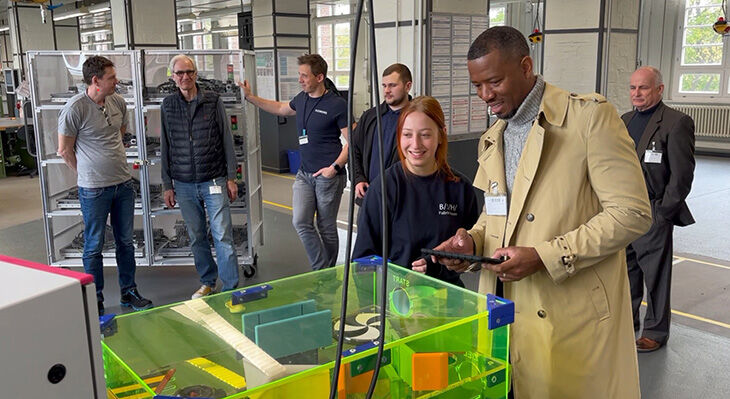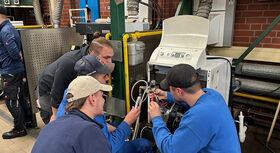Guest Article: German apprenticeship collaboration yields new strategies to strengthen workforce and advance a thriving economy
10.06.2024
A weeklong visit by leaders from the Wisconsin Department of Workforce Development, Milwaukee Area Technical College, and the University of Wisconsin–Milwaukee to the German cities of Bonn, Koblenz, and Berlin is sparking new strategies to boost apprenticeship on both sides of the Atlantic.

"Wisconsin passed the country's first apprenticeship law in 1911 and remains a national leader today with a model similar to Germany that requires employers to pay their apprentices for both time worked and time spent in the classroom," said Amy Pechacek, Department of Workforce Development Secretary. She led Wisconsin's delegation. "While participation in Wisconsin's Registered Apprenticeship and Youth Apprenticeship programs continues to set records, we know that expanding access to apprenticeship will make the state's workforce even more competitive, with benefits for workers, their families, employers, and communities."
Pechacek said the ongoing collaboration with Germany reflects the Evers Administration's commitment to high quality education and training that leads to family-sustaining jobs and a workforce equipped with skills that reflect employer needs. To further expand access to apprenticeship and strengthen Wisconsin's workforce for the 21st century and beyond, DWD and its partners identified six key strategies from the exchange that merit further exploration with a variety of partners. The concepts include:
- Launch of a digital technology initiative as part of an expanded Wisconsin Fast Forward grant program for technical colleges. Wisconsin Fast Forward currently offers funding for employer-led workforce training and for local school districts to purchase equipment for vocational and technical education classes. This initiative would support technical colleges in their quest to meet local employer needs with a workforce trained in the latest digital technologies, including generative artificial intelligence tools.
- Promotion of "permeable" advancement opportunities through apprenticeship. Many apprenticeship pathways offer exciting career opportunities that may be enhanced through a four-year bachelor's degree or graduate degree program. However, increased program development and outreach are needed to boost awareness of and participation in these diverse and interconnected pathways that may lead from apprenticeship to leadership in a variety of fields.
- Increased support for dual enrollment opportunities offered by local school districts. While technical colleges statewide offer high school students opportunities to register and receive credit for a variety of career and technical education classes, the cost for students to participate in some fields outstrips the ability of local school districts to pay. The goal of this initiative would be to work with partners to expand access to dual enrollment opportunities statewide to address local workforce challenges as students participate in the required related instruction for their respective youth apprenticeship program.
- Support for Youth Career Connection training for school guidance counselors. Lack of awareness of apprenticeship and its benefits among school guidance counselors may be hindering participation among students who could most benefit from these programs. Increased understanding of apprenticeship among school guidance counselors and teachers in STEM fields could significantly improve career opportunities for students while addressing local workforce challenges.
- Expanded support and apprenticeship referral opportunities for refugees and immigrants. Wisconsin's workforce has been constrained by demographic trends that have been decades in the making, including the aging and retirement of Baby Boomers and historically low in-migration. Wisconsin employers could gain a competitive advantage through expanded support to help skilled and experienced refugees and immigrants achieve Wisconsin's quality standards. Apprenticeships also could be leveraged to build on the existing skillsets of refugees.
- Research to identify possible attitudinal and generational barriers to apprenticeship. Anecdotal evidence from both Germany and Wisconsin suggests that parental attitudes and lack of understanding of the benefits of apprenticeship may pose barriers to participation among students and young adults as well as women. This effort would involve a longitudinal study of attitudes and engagement related to apprenticeship in Wisconsin (and potentially Germany) that could inform further outreach and education efforts to connect families with apprenticeship offerings.

The Wisconsin exchange to Germany was sponsored by the Federal Ministry of Education and Research (BMBF), the Federal Institute for Vocational Education and Training (BIBB), German Trade Union Confederation (DGB) and the German Office for International Cooperation in Vocational Education and Training (GOVET). In addition to visiting the federal offices, the five-member Wisconsin delegation met with regional employers and training institutes including Siemens Energy, AEMtec, the HWK Koblenz Chamber of Crafts, the LIFE career and educational opportunities organization, the Berlin Chamber of Crafts, the Confederation of German Trade Unions, and the Berlin Automotive Technical College.

Organized by German counterparts Hermann Nehls, project leader, and Dr. Hannelore Kress, senior technical advisor with the German Office for International Cooperation in Vocational Education and Training, the Wisconsin delegation included: DWD Secretary Amy Pechacek, DWD Assistant Deputy Secretary Jennifer Sereno, DWD Division of Employment and Training Administrator Michele Carter, DWD Apprenticeship Bureau Director David Polk, Milwaukee Area Technical College Director of Apprenticeship Dave Stuart, and UW–Milwaukee's Institute of World Affairs Director Doug Savage.
The visit builds on German visits to Wisconsin in 2018, 2021, and 2022, and a Wisconsin visit to Germany in 2020.
In 2023, Wisconsin saw a record high of 16,384 Registered Apprentices with a record of more than 2,900 employers participating. A record high of 8,357 Youth Apprentices enrolled during the 2022-23 school year with a record 5,719 employer sponsors participating. Wisconsin's apprenticeship offerings span more than 180 active trades covering a number of different employment sectors. While the construction and manufacturing sectors draw the largest number of participants, new offerings in health care, teaching, IT, and environmental fields are increasingly popular.
Apprenticeships in Wisconsin include an on-the-job training and supplementary classroom education. During the first two years of the apprenticeship, each apprentice must attend at least 144 hours of instruction. If the apprenticeship is longer than two years, the apprentices must attend at least 400 hours of related instruction.
* From left to right, Dr. Hannelore Kress, Senior Technical Advisor, GOVET,German Apprenticeship Exchange Project Leader Hermann Nehls (DGB) are joined by Wisconsin delegation members DWD Secretary Amy Pechacek, DWD Apprenticeship Bureau Director David Polk, DWD Assistant Deputy Secretary Jennifer Sereno, DWD Division of Employment and Training Administrator Michele Carter, Milwaukee Area Technical College Director of Apprenticeship Dave Stuart, and UW–Milwaukee's Institute of World Affairs Director Doug Savage.